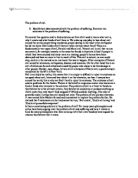Examine two solutions to the problem of suffering
Examine two solutions to the problem of suffering (21)
Evil and Suffering are in the world in two forms; Natural evil, which is the apparent malfunctioning of the natural world, such as disease and natural disasters and Moral evil, which is when humans commit acts of viciousness or injustice upon other humans or animals. Suffering was described by the apologist Thomas Aquinas as a 'privation of goodness' and John Hick described it as 'physical pain, mental suffering and moral wickedness.' St Augustine defined evil as 'that which we fear or the act of fearing itself.'
Augustine provides one response to the problem of suffering which is known as the Augustine Theodicy. He suggests that suffering is a consequence of sin. That God, just as it says in Genesis with the Doctrine of original sin, created the world 'perfectly' and it was the presence of Adam and Eve that led to 'the fall' of humanity and the presence of suffering. Augustine believed that God is right not to intervene to put a stop to suffering. He firmly thought that God is a righteous one who at the end of time will deal with those who rejected him. A key idea central to Augustine's defence of God is his Principle of Plenitude. This principle shows the great diversity of the universe that God created so a whole range of 'eternal ideas' should become incarnated in a world of sense and experience. So, even though there is inequality and unfairness, God's world is still 'perfect' because it is diverse. Although, the world looks imperfect to us because we are looking at it from a limited and distorted perspective. Therefore, Augustine's theodicy says that all things that God created are good and even the apparent evil in our world contributes to bringing about perfection as a whole.








